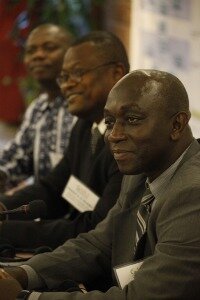'A new dawn' in health care in Sierra Leone
 The idea was to hold a mock press conference, but to make it as real as possible.
The idea was to hold a mock press conference, but to make it as real as possible.
A three-member team from Sierra Leone’s Ministry of Health and Sanitation, arriving with packets stuffed with a press release, background information, and press clippings, gave a presentation today on the country’s free health care initiative at the MLI Learning Collaborative Forum. Colleagues from Mali, Ethiopia, Senegal, Nepal and the United States took on identities as reporters from local and international press. The forum, held for four days in Addis Ababa, features a number of presentations from country groups as well as field trips to see first-hand Ethiopia’s health initiatives.
The mock press conference was designed to underscore the importance of communicating the work of Ministries to the media. While the event may have been a pseudo-news conference, the information presented was real: In the first three months of the initiative, malaria treatment for children under five had doubled, and the number of women giving birth in health facilities outnumbered those giving birth at home for the first time in a generation, according to the group’s press release.
Fofana, Kargbo, and Koroma
"We are witnessing a new dawn in the history of health care in Sierra Leone," Dr. Samuel A.S. Kargbo, the director of reproductive health, said in his opening line to the gathering. He and his colleagues – Amara Koroma, principal accountant in the Ministry, and Ibrahim Fofana, senior donor/NGO liaison officer – then talked about the problems that prompted the initiative, the government’s financing, and the assistance from donors.
Demonstrating government commitment, Koroma said that the government will pay an additional $10.5 million this year in salary increases to health workers; DFID, the British international aid organization, will pitch in $1.5 million for salaries. In all, he said, the free health care initiative will cost an additional $40 million this year, and the government will contribute nearly half that amount.
"Everyone is committed to making this work," he said. But those playing reporter roles from CNN, BBC radio, the Economist and a host of Sierra Leone outlets, including the broadcast station SLBC, pressed hard on the sustainability of the initiative.
Kargbo said he had no doubt that the free health initiative was here to stay. "Everyone wants to ride on the back of success,’’ he said. "I don’t see the government or its donor partners walking away. The program is so popular right now in Sierra Leone."
Live-blog from Ethiopia:
Part 1: MLI Live-blog from Addis Ababa
Part 2: ‘Its Always Good to Think Big’
Part 3: Mali’s Path to Community Health Insurance
Part 5: Want to Bargain? The Nepalis can Help
Part 6: From Mali to Nepal: The Trail of a Negotiator
Part 7: Ethiopia’s New Plan: ‘It’s going to Really Improve this Place’
Part 8: Ethiopia and the Importance of Family Planning
Part 9: Gang of Four: Table Talk with Reproductive Health Directors
Part 10: Ethiopia’s Tedros: Four Steps to Owning Health Programs
Forum Wrap-up, Part 1: Marty Makinen and Amanda Folsom
Forum Wrap-up, Part 2: Rosann Wisman
Photo credit Dominic Chavez.
Keyword Search
MLI works with ministries of health to advance country ownership and leadership. This blog covers issues affecting the ministries and the people they serve.
Connect with Us
![]()
![]()
Categories
Blogs We Like
- Africa Can End Poverty
- Africa Governance Initiative
- Behind the Numbers
- CapacityPlus
- Center for Global Health R&D Policy Assessment
- Center for Global Development: Global Health Policy
- Center for Health Market Innovations
- Global Health
- Global Health Hub
- Global Health Impact
- The New Security Beat
- PAI Blog
- RH Reality Check
- Save the Children
- Transparency and Accountability Program
Contact Us
Please direct all inquiries to
